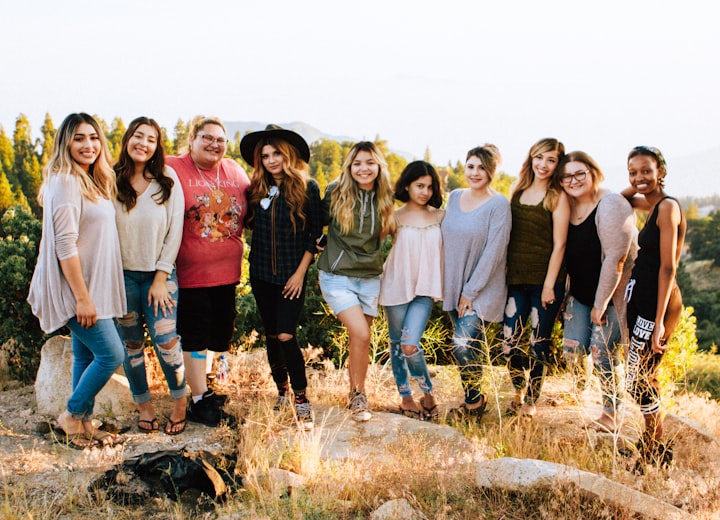How to Pick Up Any Language, Anywhere, and Better Your Soul
If there's anything that could be missing in our quest for a healthier soul, its the ability to communicate with the human beings around us.

Quick question: what is that thing, that marvelous thing, that makes living in another culture so... soul-satisfying?
There is a Chinese proverb: "to learn a language is to have another window from which to view the world".
I lived in the northern city of Chiang Mai, Thailand, for 1 and a half years, and though that seems like a not very long period of time, my soul has changed. I learnt so much. And the greatest takeaway I got from that sojourn?
I would have to say... language.
I say that not because I particularly have a fondness of the Thai language, but because learning another language is like opening your eyes to a whole new universe.
An irremovable imprint was left on my soul. I became much more polite in my demeanor when I spoke with people, because I was so in love with my newly acquired language. I felt a lot more confident in myself too, knowing that I had improved myself, which was good for my psychological health.
And that is why, wherever you are, picking up the local tongue, even if it's just some tourist phrasebook lines, is important. And that is also why, I am about to share with you everything I learnt in my language quest.
I present to you, 3 tips on how to pick up any language, anywhere.
1. Know The Essentials - Learn Core Vocabulary

Photo courtesy of Unsplash
Imagine you had perfect fluency in your target language.
You know how to conjugate every irregular verb in Spanish flawlessly and instantaneously, so you can chat up that cute chica at the other table.
You have memorised your first 1000 Chinese characters so you can stop relying on the bad restaurant menu translations.
But do not get ahead of yourself just yet. You can't achieve that kind of fluency overnight. You have to start somewhere...
You have to start with the basics. And a great and proven way to do that is by finding and learning 100 core vocabulary word lists.
Let me explain. Core vocabulary are the absolute most basic words in a language, and the most common and useful ones. Having a good command of the language core like having an all-purpose linguistic survival kit.
Building a good core vocabulary is easy. Just type "(target language) 100 core words" on your favourite search engine and results should come up. If there are no such results for the language you are learning, don't lose hope! There is a simple but slightly less convenient remedy. Simple find an English core vocabulary list and translate the words into the target language and voilà! You would have created your own word list!
After you're done with the first 100 hundred words, consider increasing the number of words to learn with a larger list. This technique is an effective way to quickly and efficiently internalise words into your memory en masse.
2. Learn to Converse, Grammar Will Come Naturally
Do you know what is one of the biggest mistakes language learners make?
They spend hours upon hours studying grammar! And at the end of it all, they still would not be able to hold any real conversations with native speakers!
Students of the Latin language have been repeating this fault for centuries and we still don't see many people being able to order a double cheeseburger in the ancient Roman tongue.
Of course, this is not to say that we can forget all about learning grammar. In fact, a tip for the erudite learner would be to read an academic descriptive grammar of the target language (e.g. A Grammar of Hawaiian). But make sure you don't dwell on it too much and waste valuable time that could be used more to achieve more practical goals.
So, do not fret over the intricacies of grammar. Learn to converse meaningfully instead.
Holding a conversation where you are able to communicate your thoughts accurately to the person you are speaking with does not require impeccable word forms or on point pronunciation.
In fact, one of the biggest lessons I learnt when I was learning Thai is that it's okay to make mistakes. But that's not the only lesson...
When my words couldn't get through to the person I was talking to, I had to use body language and gestures until I knew I was understood. Then, my conversation partner did something spectacular; he opened his mouth and said the correct form of what I was trying to tell him.
And that brings us to our next point...
3. Stop, Look, and LISTEN
The second lesson is to listen.
One of your greatest resources to learn the language is the people - the native speakers.
This is where actually living in the country where your target language is spoken is a huge plus.
As much as you can, listen to everything everyone says. If you have a group of local friends, pay close attention to how they speak among themselves in their language. What you discover in their speech might be surprising...
While in Thailand, I learnt many important informal colloquialisms by listening to my friends talk with each other. The words I learnt are not usually included in textbooks or phrasebooks. Heck, if not for them, I wouldn't have known there was another word for "I" and "you" in Thai!
If you do not live in a country where the language you are learning is spoken, fret not because you still have a ton of resources! It is the age of technology and the internet, and there are masses of websites and eBooks dedicated to many languages and smartphone apps like Duolingo (a gamified language-learning experience) to cater to your desire to learn. Songs and music are also a good source of listening material.
So there you have it! 3 simple tips to guide you on your quest for communication. As you learn more and more about your target language, these techniques will become second nature to you, and eventually, you'll experience and see the beauty that I saw when my eyes and ears were opened to that new universe of language. And maybe you will feel your soul become more complete as I felt. As they say in Sanskrit, namaste (I bow to you).
About the Creator
Dylan Scott
Originally from Singapore, I've lived in Chiang Mai, Thailand, for 1 and a half years. I love languages and linguistics, and all that defines human culture.






Comments
There are no comments for this story
Be the first to respond and start the conversation.